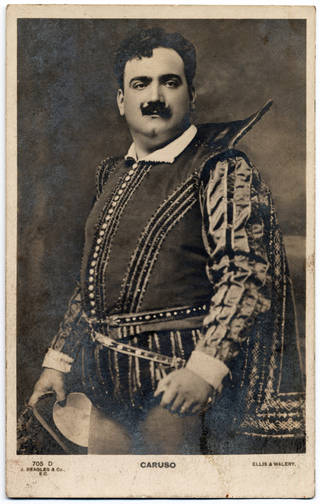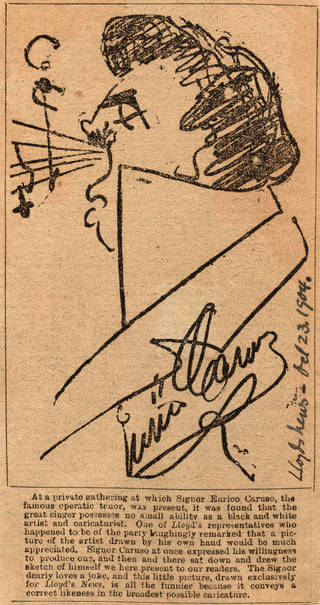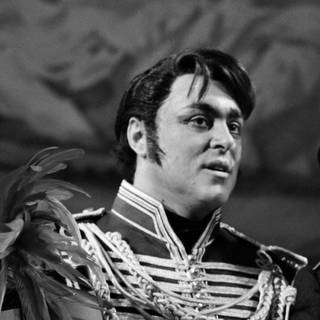The male stars of opera are undoubtedly the tenors, representing the highest vocal range and singing the most celebrated roles. Photographs and drawings in our collections document these influential singers and their memorable performances.
Enrico Caruso (1873 – 1921)
The Italian tenor, Enrico Caruso, made his operatic debut on 15 March 1895 at the Teatro Nuovo, a back street theatre in Naples. After two years singing in Southern Italy, he auditioned for Giacomo Puccini, who was looking for a leading tenor for a performance of La Boheme. On hearing Caruso sing, Puccini reportedly exclaimed: "Who has sent you to me? God?". Caruso went on to perform at all the major Italian opera houses and then became an international star.

Through his recordings, Caruso was the first opera singer to win a mass audience. People who had never seen an opera owned his records. His recording of Canio's aria from Pagliacci was the first million-seller. Asked what made a great singer, he said: "a big chest, a big mouth, ninety per cent memory, ten per cent intelligence, lots of hard work and something in the heart".
Caruso was a talented caricaturist. He drew self-portraits and made spontaneous and witty sketches of colleagues and strangers wherever he went. His doodles often captured a candid likeness of the person, but they were never cruel.

Feodor Chaliapin (1873 – 1938)
Feodor Chaliapin was born in Kazan in Russia in 1873, the son of a peasant. He was largely a self-taught singer. He never attended music school and learned through performing with provincial Russian opera companies. He sang in Europe from 1901, but it was not until after 1908, when Diaghilev arranged Russian opera seasons in Paris and London, that he was heard singing the great Russian operas, previously unknown in Europe.

Chaliapin's voice had extraordinary depth, richness and magnitude. Mary Ellis, who sang opposite him in New York, remembers his voice as being like a huge church bell that literally shook her with its vibrations. Chaliapin used costume and make-up to great effect. He sang in the opera Faust all over the world, including some performances at Covent Garden, London, in 1928. Traditionally, the role of Mephistopheles had been played as a charming trickster, but Chaliapin’s interpretation was the devil incarnate.

Plácido Domingo (b. 1941)
Although born in Madrid, at the age of eight Plácido Domingo had moved to Mexico with his parents, who started a zarzuela (Spanish music genre) company. His vocal talents were recognised and he first appeared as a baritone in Mexico City when he was only 16. At 18 he made his operatic debut. Within two years he was singing on the same stage as Joan Sutherland.

Domingo has sung all over the world and is a major recording star. With Luciano Pavarotti and José Carreras, he became a household name through the ‘Three Tenors' concert at the World Cup in Rome in 1990. He is an opera star of the technical age – one performance of Tosca was broadcast to over one billion people in 117 countries. Domingo commented, "I have a divine gift. I must share it and this is a way of doing so".
Luciano Pavarotti (1935 – 2007)
Luciano Pavarotti was known to millions, including those who had never set foot inside an opera house. Born in Italy in 1935, as a child he heard recordings of Beniamino Gigli, Italy's greatest tenor after Caruso, and dreamed of becoming an opera singer. For six years he studied singing and worked for an insurance company until, in 1961, he won a singing competition. Two years later he was singing at the Royal Opera House in Covent Garden, London as Rodolfo in La Bohème.

As well as an opera star, Pavarotti became a media figure, appearing in commercials and on chat shows. He had a distinct flair for keeping in the public eye. His concerts in open spaces like Central Park in New York and Hyde Park in London helped make opera popular with a mass audience. Pavarotti fitted the popular public image of an Italian tenor. His size matched his ebullient personality and he had considerable natural charm. Vocally, he was exuberant and emotional. He could make each member of an audience feel that he was singing to them alone.


